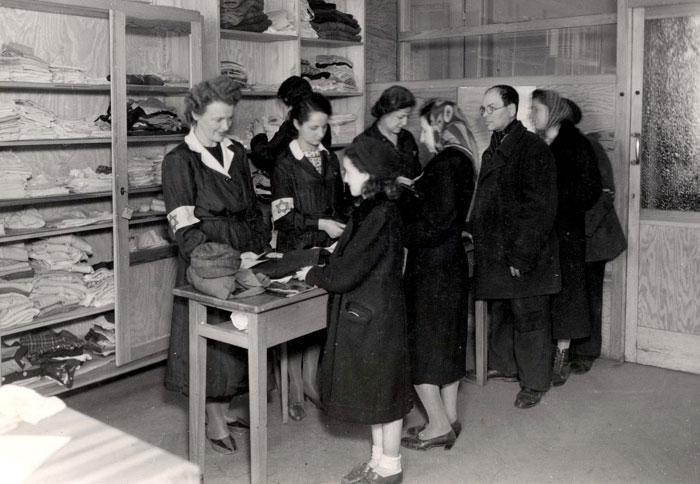"Fate has willed us apart… Yet that same fate has also willed that during the years of our people's greatest misery, your mother is fulfilling a mission in order to ease this terrible suffering. If I survive this difficult period, I think I will be able to say that I have not lived in vain. In this spirit you must bear this separation, since the shared destiny of the Jewish people stands above any personal pain."
From a letter by Gisi Fleischmann to her daughter Aliza in Eretz Israel, 6 September 1942
Gisi Fleischmann, from Bratislava, Slovakia, was in her forties during the Holocaust. Her two daughters had immigrated to Eretz Israel before the war. For years, she had been involved in public service in the fields of welfare, education, youth hachshara and Jewish emigration, and was active in the Women’s International Zionist Organization and the Joint Distribution Committee.
At the beginning of 1942, when Fleischmann and her colleagues learned about the plan to deport the Jews of Slovakia, Jewish figures in Bratislava formed an underground organization that came to be known as "the Working Group." Thanks to Fleischmann's organizational skills and her contacts with various officials in the Slovak administration, she was chosen by her peers to lead the Group, along with Rabbi Michael Dov Weissmandel. She was the only woman in a group of men. In the spring of 1942, she and her comrades took action to stop the deportations of Jews from Slovakia to Poland. Besides her involvement in aid and rescue operations, Fleischmann also labored to alert the free world to halt the deportation of Jews from Slovakia to Poland.
Along with the members of the Working Group, Fleischmann was one of many Jews who risked their lives in order to save fellow Jews living under the Nazi regime, which aimed and acted to annihilate world Jewry as part of the “Final Solution.” Germany was aided by collaborators from the occupied nations who played an active role in the persecution, and sometimes even murder, of the Jews. In a reality where every Jew was in danger, it was natural for individuals to focus on trying to save themselves, their families and their friends. Even though the Jewish people had internalized the generations-old principle that "all Jews are responsible for one another," choosing to risk one’s life for others cannot be taken for granted. Jews who attempted to save other Jews took a double risk, since they, too, were persecuted under Nazi Germany’s murderous policy. They often unconditionally saved fellow Jews whom they did not even know, and for nothing tangible in return. The prime motivations for their activity were their accurate perception of reality, their awareness of the fate awaiting all Jews, and their profound commitment to Jewish solidarity.
Individuals conducted rescue initiatives on their own, or as part of underground movements and various Jewish institutions. Rescue operations took place both in those countries where the Jews were persecuted, as well as in countries to which they fled. Diverse rescue attempts included clandestinely crossing borders, preparing and circulating false papers, helping Jews emigrate or hide, and establishing aid and welfare institutions for the benefit of all persecuted Jews. In France, the OSE (Œuvre de Secours aux Enfants, Children's Aid Society) relocated Jewish children as well as adults from internment camps and sent them into hiding in children’s institutions and private homes. Various organizations and frameworks in which young people participated, such as Zionist youth groups and the Scouts, helped hide children and lead them across the border to Switzerland and Spain. After Nazi Germany occupied Hungary in 1944, local Jewish youth groups smuggled across the border to Romania, fabricated lifesaving false papers and helped children in orphanages that they founded throughout Budapest. Zerach Warhaftig worked to save yeshiva students in Lithuania, while Hennie and Yehoshua Birnbaum worked to save Jewish orphans in the Netherlands — first in the Westerbork transit camp and later in Bergen-Belsen, to where they were deported. In Romania, the Jewish leadership under Dr. Wilhelm Filderman acted to aid Jews who had been deported to Transnistria, sending food and even ransoming some of the people. Jewish organizations operating out of neutral Switzerland also took action to smuggle Jews into the country. When he fled to the woods, Tuvia Bielski decided to form a partisan unit composed of families, including children, women and old people. The vision and mission of the group he founded was that saving lives outweighed all other considerations. Better to save a single Jew, he said, than to kill twenty Germans.
These examples are only a small part of Jewish attempts to aid and rescue other Jews, but they indicate the extent and scope of rescue efforts. Not every rescue attempt was effective, however, and even though Jews made numerous attempts to rescue other Jews, to do so successfully was almost impossible under Nazi Germany’s systematic murderous policy. The vast majority of the Jews who lived under Nazi German occupation were murdered in the Holocaust. Shmuel Oswald Rufeisen sent information to the Jewish residents of the Mir ghetto in Belarus and helped them flee to the woods, but only a few of the Jews who escaped the ghetto survived. Numerous other rescue actions by Jews were not documented or preserved due to their clandestine nature, or because their participants were murdered.
Many of the Jewish rescue initiatives owe a great debt to help extended by non-Jews, including those later recognized as Righteous Among the Nations. The courage of individuals and groups, both Jewish and non-Jewish, during the Holocaust shows that solidarity was maintained in a time of existential danger, and humane and moral values were adhered to, including the will and the obligation to help one’s fellow human being. The Jewish rescuers faced frequent hardships and dilemmas, yet they chose to act on behalf of their fellow Jews. It is incumbent upon the Jewish people, and the world, to remember and learn from these amazing deeds.







